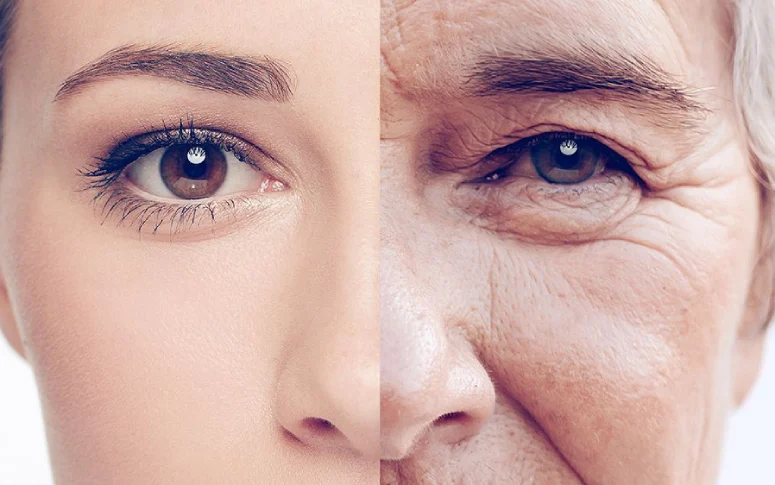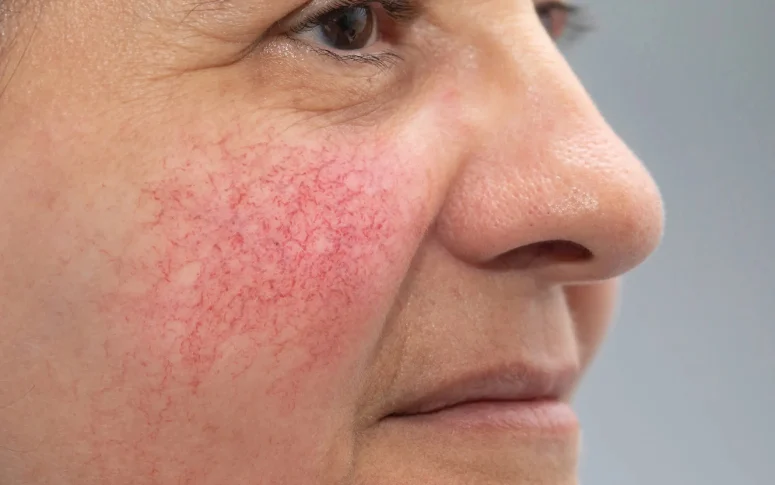1. Skin Aging
While milk is rich in proteins, antioxidants, and vitamin D that protect your skin from sun damage and boost its elasticity, it’s often associated with an accelerated aging process.
Research found that dairy consumption can reduce insulin sensitivity, which is a risk factor for developing type 2 diabetes. As milk consumption can increase insulin production, it may have a notable impact on the aging process.
Besides, consuming too much milk can lead to chronic inflammation, which can also be a culprit for premature skin aging.
However, studying the specific effects of milk on skin aging is challenging due to the inherently slow nature of aging.

2. Digestive Discomfort
Lactose intolerance is when your small intestine doesn’t make sufficient amounts of lactase, a digestive enzyme that breaks down the lactose in dairy products.
Consuming too much milk can cause digestive problems, typically diarrhea and bloating.
If you’ve noticed that you’re intolerant to milk, consider switching to lactose-free milk, which is commercially produced by adding lactase to regular cow’s milk.

3. Bone Fractures
Milk and dairy products are rich in calcium and vitamin D, promoting peak bone mass development and reducing the risk of fractures.
However, a Swedish study suggested that consuming three or more glasses of milk daily can increase the risk of fractures and nearly double the risk of death.

4. Cancers
Although excessive milk consumption is often linked to cancer, there is not enough scientific evidence that milk and dairy products can cause cancer.
A study found that people who consumed dairy products regularly had a greater risk of developing liver and breast cancer. Additionally, regular milk consumption was also associated with lymphoma, but the collected data was statistically insignificant.

5. Heart Disease
As cow’s milk and related dairy products contain saturated fats, incorporating too much milk in the diet can considerably increase blood levels of cholesterol, which is linked to heart disease risks.
Note that one serving of full-fat dairy has approximately 5 grams of saturated fat, so consuming whole milk or 2% milk every morning is perfectly fine, as long as the rest of the diet doesn’t include too much saturated fats.

6. Skin Sensitivities
Milk can cause skin sensitivities, resulting in flaring acne, rosacea, and eczema. These problems are often caused by constant inflammation, overproduction of skin cells, and increased oil production due to milk consumption.
If you notice that your skin develops itchy raised bumps and redness, you most likely have a dairy allergy.
According to the American Academy of Dermatology, products made from milk, such as cheese and yogurt, are safe for consumption, as no studies have linked them to more breakouts.

7. Hormonal Imbalances
As dairy products are rich in calcium, high intake can lead to hormonal imbalances. While it’s unlikely to get too much calcium from milk, it’s still recommended to avoid consuming excessive amounts of dairy products on a daily basis.
Besides, dairy products with a high fat content contain high levels of estrogen, interfering with your hormone levels and promoting endometriosis along with hormone-related cancers.

8. Weight Management
Although milk and dairy products don’t lead to weight gain, they can still make weight management a bit challenging.
This is because milk is inherently calorie-dense and packed with natural sugars, with around 50 calories per 100 grams of 2% milk.
Depending on the amount of dairy products you consume daily, you may be getting too many calories and sugars without even realizing it.
If you’re trying to manage your weight, make sure to check the energy content of dairy products before incorporating the right amount into your diet.

Was this page helpful? Give us a thumbs up!












